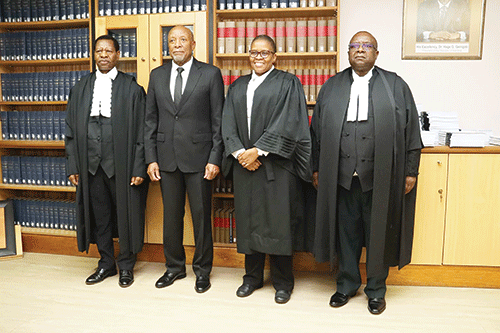President Nangolo Mbumba said despite the Office of the Judiciary at times receiving unfounded criticism from the public, they must still ensure that justice is accessible, timely and affordable to all citizens.
Last year, the Judiciary was criticised by the public for secrecy around the appointment of judges. This criticism saw the Judicial Service Commission holding Namibia’s first public interviews for judges towards the end of the year.
Speaking during the official opening of the 2024 Legal Year yesteday, the Head of State said it is disheartening to observe that at times, the Judiciary is subjected to unjustifiable criticism for its decisions in the performance of its professional duties. “Such criticism of judicial officers could become a hindrance to the effective exercise of judicial functions and the administration of justice. I, therefore, urge Namibians to desist from actions that could be tantamount to interference with the work of the Judiciary,” emphasised Mbumba.
He said it is important that the courts, judges and judicial staff perform their duties without unwarranted pressure or influence from any quarter of society.
Mbumba added that during the ‘year of expectations’, the Judiciary and the broader legal fraternity are expected to carry out their functions with integrity, and in the spirit of patriotism.
“This is a crucial year. Therefore, we cannot have a ‘business as usual’ approach. I urge every member of the Judiciary and the legal fraternity at large to ensure that justice reaches all Namibians, and that the Judiciary contributes tirelessly to our collective welfare and the betterment of Namibia, living up to the expectations of our citizens,” he said.
Mbumba acknowledged the budgetary constraints of the Judiciary, and praised the office for managing to reach notable milestones during the 2022/2023 financial year.
Judicial milestones
Chief Justice Peter Shivute said 2023 was an eventful year, full of significant firsts for the Judiciary.
That year saw the judiciary appoint female judges to the bench, namely Hannelie Prinsloo, Esi Schimming-Chase and Rita Makarau from the Constitutional Court of Zimbabwe.
The chief justice said the appointments not only give a female representation, but enrich the range and depth of judicial insight at the summit of the legal system.
“The Supreme Court also made commendable strides in expanding its capacity to hear more cases. By operating two courtrooms concurrently during each of its three terms, the court has successfully increased the number of cases set down for hearing, thereby significantly reducing its backlog of cases,” noted Shivute.
On the performance of the courts, he said despite the Supreme Court witnessing a surge of 59% in appeal cases, it managed to dispose of 93.5% of the cases.
The High Court main division’s civil stream recorded a disposal rate of 78%.
“Regarding the handling of criminal cases in the High Court’s main division, the court achieved a disposal rate of 28% for indictments. Nevertheless, the court demonstrated higher efficiency in other areas, accomplishing a 90% disposal rate for criminal appeals, and an 83% rate for reviewing cases from the lower courts,” he continued.
Speaking about the lower courts, the chief justice said key promotions were made to reward judicial competence and dedication.
In 2023, the regional and district courts handled 4 682 additional cases, compared to 2022.
“Despite this surge in caseload, the lower courts accomplished a 37% case disposal rate in 2023, marking a 5% increase from the 32% disposal rate achieved in 2022,” observed Shivute.
He went on to say that the Judiciary will honour late president Hage Geingob’s legacy of unwavering commitment to the rule of law, separation of powers and constitutionalism.
-mamakali@nepc.com.na



